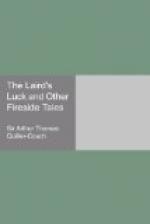The five, therefore, form an elongated St. Andrew’s cross; but nobody can tell for certain who built them, or why. They are all alike; each, built of cob, circular, whitewashed, having pointed windows and a conical roof of thatch with a wooden cross on the apex. When I was a boy these thatched roofs used to be pointed out to me as masterpieces; and they still endure. But the race of skilled thatchers, once the peculiar pride of Gantick, has come to an end. What time has eaten modern and clumsy hands have tried to repair; yet a glance will tell you that the old sound work means to outwear the patches.
The last of these famous thatchers lived in the round-house on your right as you leave Gantick by the seaward road. His name was old Nat Ellery, or Thatcher Ellery, and his age (as I remember him) between seventy or eighty. Yet he clung to his work, being one of those lean men upon whom age, exposure, and even drink take a long while to tell. For he drank; not socially at the King of Bells, but at home in solitude with a black bottle at his elbow. He lived there alone; his neighbours, even of the round-house across the road, shunned him and were shunned by him: children would run rather than meet him on the road as he came along, striding swiftly for his age (the drink never affected his legs), ready greaved and sometimes gauntleted as if in haste for his job, always muttering to himself; and when he passed us with just a side-glance from his red eyes, we observed that his pale face did not cease to twitch nor his lips to work. We felt something like awe for the courage of Archie Passmore, who followed twenty paces behind with his tools and a bundle of spars or straw-rope, or perhaps at the end of a ladder which the two carried between them. Archie (aged sixteen) used to boast to us that he did not fear the old man a ha’penny; and the old man treated Archie as a Gibeonite, a hewer of wood, a drawer of water, never as an apprentice. Of his craft, except what he picked up by watching, the lad learned nothing.
What made him so vaguely terrible to us was the common rumour in the village that Thatcher Ellery had served once under his Majesty’s colours, but had deserted and was still liable to be taken and shot for it. Now this was true and everyone knew it, though why and how he had deserted were questions answered among us only by dark and frightful guesses. He had outlived all risk of the law’s revenge; no one, it was certain, would take the trouble to seize and execute justice upon a drunkard of seventy. But we children never thought of this, and for us as we watched him down the road there was always the thrilling chance that over the hedge or around the next corner would pop up a squad of redcoats. Some of us had even seen it, in dreams.
II
This is the story of Thatcher Ellery as it was told to me after his death, which happened one night a few weeks before I came home from school on my first summer holidays.




